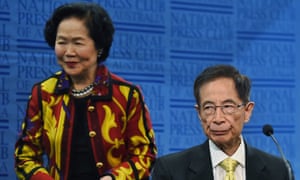WHEN PUSHBACK COMES TO SHOVE IN AUSTRALIA'S CHINA RELATIONSHIP
Feb 8, 2018


Australia’s relationship with China has entered an unprecedented new era.
New laws introduced this week that crack down on foreign interference in Australia’s political processes are the clearest marker yet that Canberra and Beijing now see each other in very different terms. At their heart, the laws represent more than an attempt to stamp out hostile and covert behaviour. They are an attempt by the Turnbull government to reframe one of Australia’s most complicated bilateral relationships.
Energised by President Xi Jinping’s chauvinistic speech to the 19th congress of the Chinese Communist Party and alarmed by mounting evidence of Beijing’s meddling in Australia’s affairs, the government has moved to defend our institutions from China’s increasingly intrusive foreign policy.
By moving to protect free speech and corruption-free politics, the Turnbull government is redefining the terms of its relationship with China, at the same time pushing back against Beijing, which sees the covert manipulation of open democracies as a legitimate means of conducting its foreign policy.
As Malcolm Turnbull said when he introduced the foreign interference bill, “Our relationship with China is far too important to put at risk by failing to clearly set the terms of healthy and sustainable engagement. Modern China was founded by the statement that Chinese people have stood up. And today, and every day, the Australian people stand up and assert their sovereignty in our nation, with our parliament and with our laws.”
READ MORE
China relations to stay strong /PETER JENNINGS
In Australia, a widespread view now exists that Beijing has been meddling directly — and effectively — in Australian political life, corrupting the integrity of its institutions and diminishing the quality of the public debate. Such concerns cut to the heart of Australian sovereignty, lending the present difficulties a sharper, more visceral edge.
In Australia, a widespread view now exists that Beijing has been meddling directly — and effectively — in Australian political life, corrupting the integrity of its institutions and diminishing the quality of the public debate. Such concerns cut to the heart of Australian sovereignty, lending the present difficulties a sharper, more visceral edge.
It is one thing for Beijing to throw its weight around in the far-off horizons of the South China Sea. It is quite another for it to buy influence in Australian parliaments or mute free debate on university campuses.
In the public’s eye, the tendency has long been to see China as a cash cow rather than a security threat. Debates about China’s ambitions in the South China Sea or freedom-of-navigation exercises have been confined largely to politicians and foreign policy wonks. Not so rarefied is the belief that for the past two decades Australia’s economic prosperity has rested largely on China’s insatiable appetite for minerals.
Both sides of politics have cultivated that view, preferring to cast China as a benevolent trading partner rather than an emerging great power whose regional ambitions must sooner or later jar with the traditional role of the US as regional stabiliser.
“The biggest single problem is that a lot of Australians have not done their homework, they have not done the hard yards to get their head around what the Chinese are doing and what they are saying,” says Ross Babbage, a former analyst with the Office of National Assessments. “A lot of people assume we’re looking at a benign power. We are not.”
The popular view is starting to change. The Dastyari affair, repeated warnings from ASIO about the scope of foreign — read Chinese — meddling in domestic affairs and a string of critical infrastructure investments, raising the spectre of Chinese espionage, are displacing that economic narrative. A darker, more suspicious image of China threatens to take its place. Anti-China sentiment will spread, usurping the transaction of Australian foreign policy with our largest trading partner.

Australian National University professor Hugh White, author of the recent Quarterly Essay on Chinese power, says the Trump presidency has exposed the limits of US power in the region as China’s own power is on stark display. This has seen the debate about Chinese influence spill from the beltways of Canberra into the wider public consciousness.

Australian National University professor Hugh White, author of the recent Quarterly Essay on Chinese power, says the Trump presidency has exposed the limits of US power in the region as China’s own power is on stark display. This has seen the debate about Chinese influence spill from the beltways of Canberra into the wider public consciousness.
“You could say it’s only in the past few months that Australia has come to recognise the kind of power China is, and there’s been an upsurge of anger on the back of that,’’ White says.
From the Chinese side, there is annoyance and a degree of puzzlement. This week the embassy said reports of Chinese meddling had been conjured from “thin air”, reflecting “Cold War biases and anti-China hysteria”. “The relevant reports not only made accusations against the Chinese government but also vilified the Chinese students as well as the Chinese community in Australia with pointed stigmatization, which in turn threatens Australia’s uncertain multicultural society. Some Australian politicians and government officials made surgical and pointed remarks outlining Australia's political mistrust between China and Australia. We categorically reject these statements .”

ANU professor Richard Rigby says the Chinese maintain an unyielding Marxist view of the world, while ignoring with belligerence what Australian's complain about, given the enormous economic benefits they have accrued as a consequence of two-way trade.
ANU professor Richard Rigby says the Chinese maintain an unyielding Marxist view of the world, while ignoring with belligerence what Australian's complain about, given the enormous economic benefits they have accrued as a consequence of two-way trade.
“Some of the people I’ve been talking to have said, ‘We’ve pretty much given up on Australia,’ ” he says. “ ‘We’re focusing on America and if we get that relationship right, then Australia will just come along.’ ”
Yet Australia has no choice but to ferociously defend the integrity of its democratic institutions. It is unthinkable that China would tolerate the sort of foreign meddling in its affairs that Beijing’s security services have engaged in so freely here. But tensions are likely to get worse before they get better.
In the wake of the government’s announcement, government sources privately are talking up the likelihood of a steady stream of prosecutions emerging as a result of the laws.
How will Beijing react to that? Will it respond with equanimity when a wealthy Chinese/Australian is jailed for being a foreign agent or will it retaliate? The government says the main thrust of the laws is to deter foreign interference rather than detect and punish it; but, to be effective, deterrents must be used from time to time. Privately, the government is bracing for the possibility that China may exploit its economic leverage as a means of retaliating against what it sees as Australian stubbornness.

Chen Yonglin, the Chinese diplomat who defected to Australia in 2005, tells Inquirer the new foreign interference laws will be “very useful” in curbing covert Chinese influence and will send an important message to China. However, he warns the effectiveness of the new laws will depend on whether cases have teeth and are prosecuted.
Chen Yonglin, the Chinese diplomat who defected to Australia in 2005, tells Inquirer the new foreign interference laws will be “very useful” in curbing covert Chinese influence and will send an important message to China. However, he warns the effectiveness of the new laws will depend on whether cases have teeth and are prosecuted.
“The first case is very important,” he says. “The first case will mean Australia really means it, (otherwise) it is just a performance to say ‘the government is doing something but we still need China and we still kneel down before China’s money’.”
He says in the US the Chinese have been far more cautious, in part because of the Foreign Agents Registration Act. Every now and then, the FBI or CIA call people in to answer questions, and occasionally they establish a case of espionage. “This is a deterrence for the Chinese. they have to be more cautious,” he says.
In Australia, he says, it has been open slather. “In Australia, it seems there’s no limitation at all. The Chinese do it publicly. It’s very extensive and wide. It seems there’s no limitations on their activity. They are brazen enough to kidnap anyone they want to kidnap. They threaten anyone they want. They bribe anyone they can bribe. It seems they are above the law in Australia. They are braver than their activity in the US.”
While the concerns over Chinese interference extend far and wide, ranging from university campuses to electricity investments, the focus of the government’s measures this week was on political influence. According to ASIO, there has been patchy but significant penetration of political parties in some parts of Sydney.
The agency is understood to have identified at least 10 candidates in local and state elections with close ties to Chinese security services. At least one made it through. ASIO believes those ties were cultivated before the politician’s election, suggesting there is a deliberate strategic policy by Beijing to insert agents of influence at all tiers of Australian politics.

Chongyi Feng, who teaches at the University of Technology Sydney and who was detained by Chinese authorities earlier this year following his criticism of Beijing, says China’s own foreign interference laws are among the strictest in the world. “The comment (from the Chinese embassy) is the highest level of hypocrisy … They are not in a position to complain about the Australian laws.”
Chongyi Feng, who teaches at the University of Technology Sydney and who was detained by Chinese authorities earlier this year following his criticism of Beijing, says China’s own foreign interference laws are among the strictest in the world. “The comment (from the Chinese embassy) is the highest level of hypocrisy … They are not in a position to complain about the Australian laws.”
Feng says China’s official reaction to Australia’s toughened stance will differ from its private, more pragmatic approach.
“They will say a lot but they don’t want any conflict because they rely so much in the resources of Australia and the goodwill of Australia to counteract the US,” he says.
PAUL MALEY
National Security EditorSydney
@paul_maley
National Security EditorSydney
@paul_maley
NICOLA BERKOVIC
Legal affairs correspondentSydney
@NicBerko
Legal affairs correspondentSydney
@NicBerko
No comments:
Post a Comment
Comments always welcome!